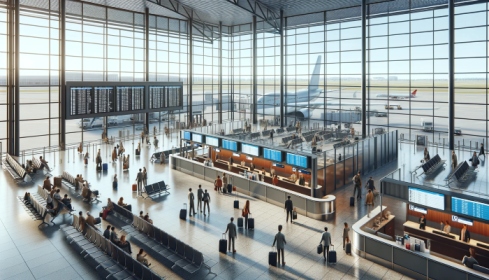Monday, September 9, 2024 A trespass incident at London’s busy Paddington Station on the morning of September 9, 2024, has caused widespread disruption, affecting thousands of commuters and travelers. The incident, which occurred around 8 am, has severely impacted train services, particularly on the Elizabeth Line, as well as other major routes such as the Great Western Railway and Heathrow Express. Delays are expected to persist until at least 10 am, with trains experiencing delays of up to 30 minutes or cancellations.
The ripple effect of these disruptions is likely to have a significant impact on both daily commuters and tourists traveling through this key transport hub. Paddington Station serves as one of London’s most important transport hubs, providing direct connections to key locations such as Heathrow Airport and various tourist destinations. The disruption caused by the trespass incident has not only affected local commuters but also international visitors traveling to and from Heathrow.

The Elizabeth Line, which offers vital connections to popular tourist areas like Abbey Wood, Shenfield, and Central London, has been particularly impacted by the delays and cancellations. Tourists, especially those on tight schedules or catching flights, are likely to feel the brunt of this disruption. With services to Heathrow Terminal 4 and Terminal 5 affected, travelers heading to the airport may experience considerable delays.
Heathrow Express, known for its fast service between Paddington and the airport, has also been affected, adding further complications for international travelers. Given the importance of London’s rail network in the tourism industry, delays at major stations like Paddington can lead to missed connections, changes in travel plans, and an overall decline in the visitor experience. National Rail has advised passengers to check for updates and seek alternative routes, but this disruption during peak morning hours could still have a significant impact on tourism and travel.
The disruption caused by the trespass incident at Paddington Station extends beyond the local commuter population to international tourists who rely on the station as a gateway to London. The station’s key routes, including the Elizabeth Line and Heathrow Express, serve as major arteries for tourists arriving at Heathrow Airport, one of the busiest airports in the world. With services delayed or canceled, international travelers may face difficulties reaching Central London or connecting to other parts of the UK.
For tourists who planned to visit iconic London landmarks, such as Buckingham Palace or the British Museum, the disruption could lead to missed tours or shortened experiences. Those on tight travel schedules, including day trips or multi-destination itineraries, may find their plans derailed. This could also impact the tourism industry in terms of visitor satisfaction and logistical ease, as smooth transportation is a key aspect of a successful travel experience.
Moreover, the delays have affected trains traveling to and from important destinations like Shenfield and Abbey Wood. Visitors staying in these areas or using Paddington as a central transport hub may encounter extended travel times, leading to a knock-on effect for their entire day’s itinerary. While this particular incident may be resolved within a few hours, it highlights the potential vulnerabilities in London’s transportation network and how disruptions can affect the broader travel and tourism sector.
Paddington Station’s role as a gateway for both local and international travelers makes it a critical link in ensuring that tourists can move smoothly through the city. Frequent or prolonged disruptions could deter some visitors from relying on London’s public transport network, especially during peak travel seasons when tourism is at its height. Tourism operators and travel agencies may also face challenges if such disruptions become frequent.
Travel companies that provide guided tours or airport transfers will need to adjust their schedules, potentially adding additional costs or inconvenience for their customers. Additionally, businesses reliant on tourist foot traffic, such as hotels, restaurants, and local attractions near Paddington Station, may feel the indirect effects of fewer tourists passing through the area due to delays. In response to such incidents, transport authorities may need to consider further measures to minimize the impact on tourists and commuters.
Enhanced communication during disruptions, alternative route planning, and faster resolution times will be key to maintaining trust in London’s transport system, especially for visitors who are unfamiliar with navigating the city’s extensive rail network. The incident at Paddington Station serves as a reminder of the importance of reliable transport infrastructure in global tourism. For travelers coming from abroad, such disruptions can be highly inconvenient, especially when they are reliant on strict schedules to catch flights or reach tour destinations.
Delays in London’s major transport hubs can have a cascading effect, leading to missed flights, hotel check-ins, or pre-booked activities. As London remains one of the most visited cities globally, ensuring smooth transport is crucial for maintaining its position as a top tourist destination. Incidents like these underline the need for contingency planning by travelers, including allowing extra time for potential delays and staying updated on travel alerts.
Additionally, international tourists may start looking for alternative modes of transportation or off-peak travel options to avoid the risks associated with busy stations during peak times. The trespass incident at Paddington Station on September 9, 2024, has caused widespread delays, affecting both local commuters and international tourists. With key routes such as the Elizabeth Line and Heathrow Express severely impacted, travelers are facing considerable disruptions.
This highlights the need for reliable infrastructure and swift communication during such events, particularly as London continues to serve as a major global tourist destination. The effects on travelers underscore the importance of efficient transport networks in ensuring a positive visitor experience in the city..



















